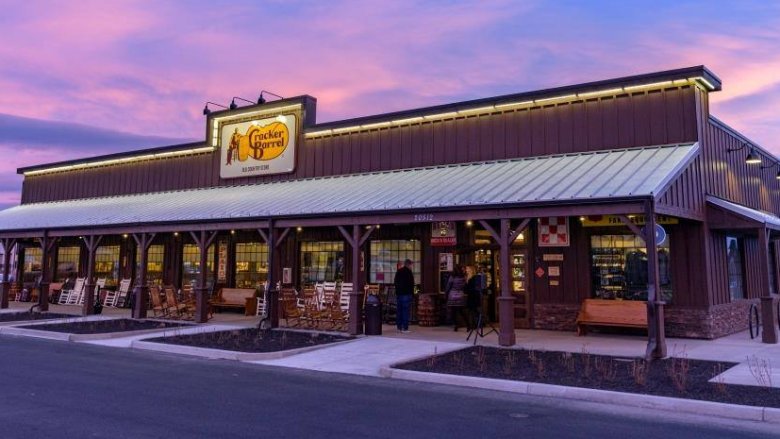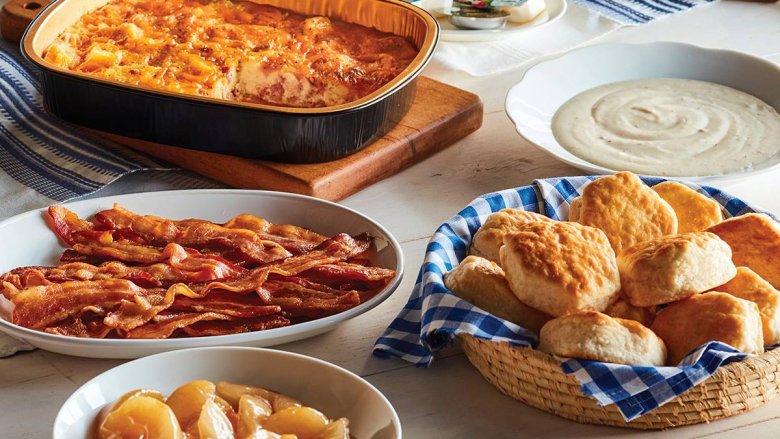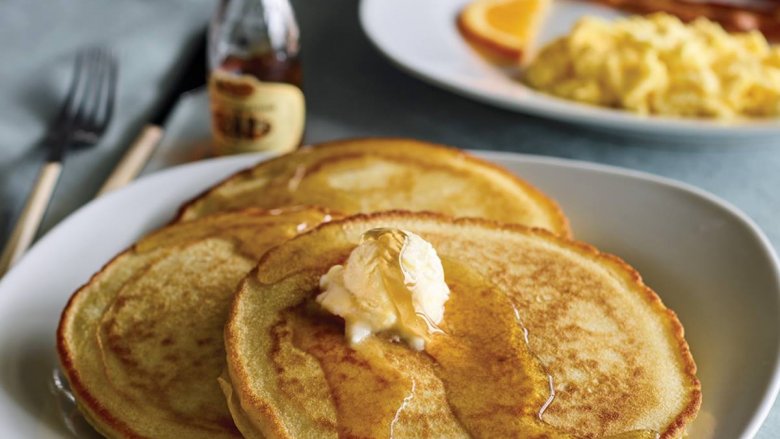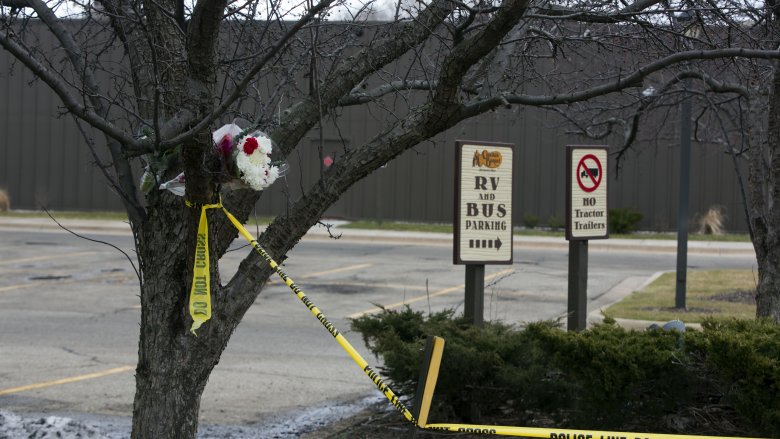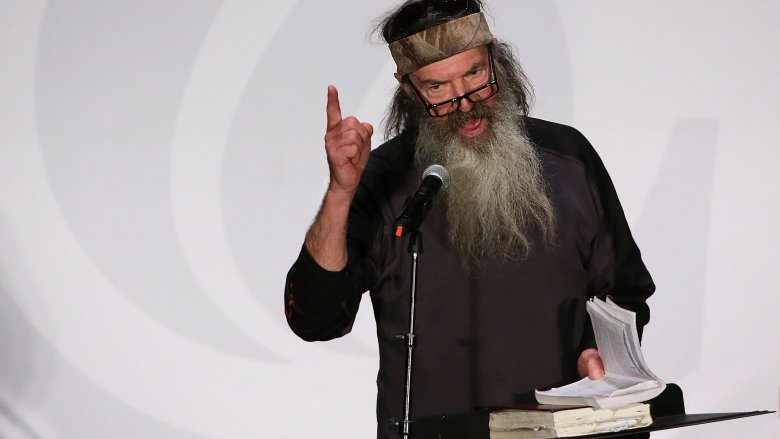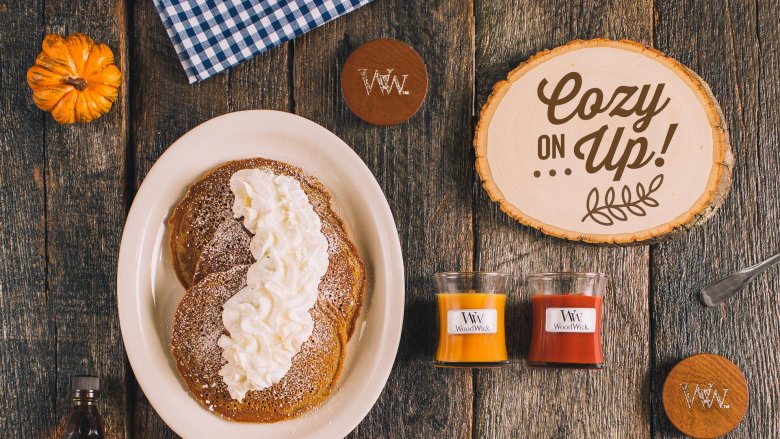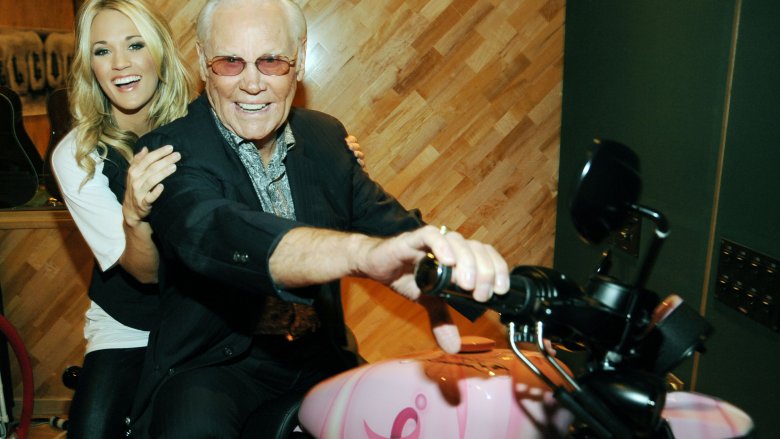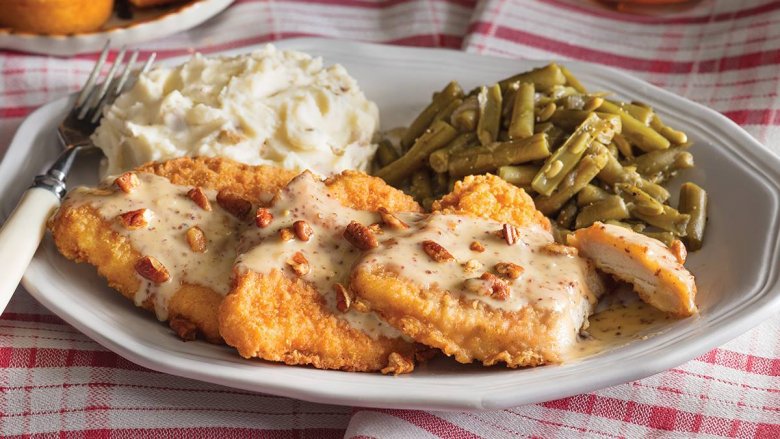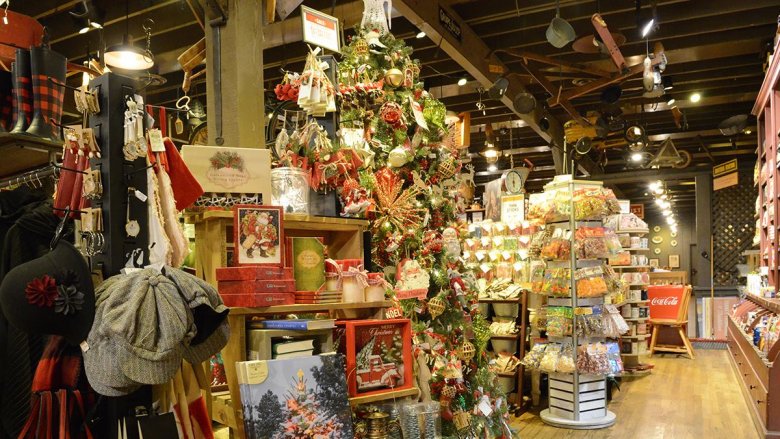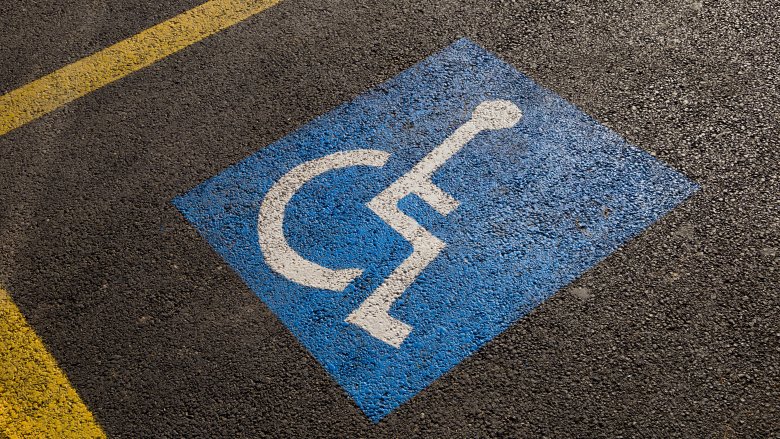The Biggest Scandals In Cracker Barrel History
Most restaurant chains come with at least a few scandals, whether it's something like a massive food poisoning outbreak or a David vs. Goliath battle against the little guys. But Cracker Barrel has had an almost shocking number of scandals, lawsuits, and accusations leveled at them, especially considering they're a relatively new chain... in the grand scheme of things, at least.
The very first Cracker Barrel opened in Tennessee in 1969, and by 1977 they had expanded to just 13 stores across the south. In 1992, they hit the $1 billion mark as far as market worth. But even as they were opening new stores and launching their employee charity program, all has not been well. Sure, many customers might love their fun and funky gift stores, their cornbread, and those oh-so-delicious apples, but it's not a feeling that's been shared by all. They've been sued by employees and customers alike, and some of the accusations are nothing short of horrible.
Accusations of racism and segregation policies
In 2004, Cracker Barrel was embroiled in several scandals, including a lawsuit brought by the NAACP and an investigation by the Justice Department. The actions were instigated by claims that black customers in several states were subjected to not only the restaurant's segregation policies, but other shockingly terrible types of treatment.
The list of accusations (via The New York Times and Fox News) was long, and included: segregated seating, seating and serving black customers after white customers, subjecting customers to racial slurs, and serving black customers food that had been fished out of the garbage. Servers were also allegedly allowed to refuse service to customers, based solely on their skin color.
The Justice Department investigation came first, and Cracker Barrel wasn't fined for their findings. Instead, they agreed to put anti-discrimination measures and training programs in place, along with hiring outside auditors and undercover diners to monitor their progress. Attorneys were quick to point out that Cracker Barrel was insisting they hadn't actually done anything wrong, and that "They're still fighting tooth and nail against all the private plaintiffs."
It wasn't enough, because just four months later news outlets were announcing they were settling a series of racial discrimination lawsuits for a whopping $8.7 million.
Continued accusations of racism
In spite of the 2004 investigations and settlements, Cracker Barrel has had continued problems with accusations of racism. They were headed to court again in 2018, after a 57-year-old Air Force veteran filed a lawsuit following a visit to a Cracker Barrel.
Randy Freeman, the owner of Distinguished Executive Transportation, LLC, said he was at a West Virginia location with several customers and ordered a soft drink. When the waitress came back, she refused to take his food order. Within minutes, the manager came over, accused him of verbally abusing the waitress, and ordered him to leave.
He later told Rolling Out, "I was taken completely by surprise when the manager came out and made these false accusations." Freeman did leave, later saying, "I was embarrassed and worried about the consequences of resisting my ejectment because I owed my ultimate responsibility to my motor coach passengers who would've been stranded had I been arrested for refusing to leave. So, I left [...]"
Witnesses added statements saying there was no reason for the accusation or for Freeman to be kicked out of the restaurant, while Cracker Barrel denied anything wrong had happened.
Going public about firing gay employees
Cracker Barrel was hiring in 1991, but thanks to a newly implemented HR policy, they were only hiring people who weren't gay. The policy didn't just forbid hiring gay employees, but they also fired at least nine current employees because of their sexual orientation.
Think it can't get worse? The New York Times interviewed one employee that had been fired under the policy, Cheryl Summerville. She had been working at Cracker Barrel for three years, and said, "They said they didn't really want to fire me, because the policy was really aimed at effeminate men and women who have masculine traits who might be working as waiters or waitresses." She continued, "But I said I couldn't just let them fire other people and keep me, because it would just be a matter of time before the policy caught up with me, too."
Cracker Barrel's response was bizarre: They finally rescinded the policy, but didn't really accept any fault. Instead they called it a "well-intentioned over-reaction to the perceived values of our customers and their comfort levels with these individuals."
It wasn't until 2002 that Cracker Barrel added sexual orientation to their non-discrimination policy, after scoring a dismal "zero" on the Human Rights Campaign's Corporate Equality Index (via the Business & Human Rights Resource Centre).
Think it's gotten better? It has, but it still has a long way to go. Cracker Barrel's score on the same index in 2018 had risen to 60/100, and 609 businesses were given a 100 rating.
The shooting at an Ohio Cracker Barrel
A fatal shooting at a Cleveland Cracker Barrel has resulted in a long investigation and lawsuits filed by family members of the people killed there.
In 2012, Kate Allen was at Cracker Barrel with her husband and their two daughters. They were celebrating the birthday of one of their girls, but she was also telling Kevin Allen she was leaving him in the wake of numerous domestic violence charges, convictions, and reports filed with local police, says Cleveland. After the conversation, Allen left the restaurant, returned with a shotgun, then shot his wife and two daughters. Police arrived, and he was shot and killed at the restaurant. While his wife and one daughter died at the restaurant, the other daughter passed away about a month later.
Not long after, Cleveland was reporting on a lawsuit filed by Kate Allen's family, condemning Cracker Barrel and the manager for not offering to help when they say she approached them for it. According to eyewitnesses, Kevin Allen had taken his wife's car keys before leaving to fetch his shotgun. She had allegedly approached the manager and asked to be allowed to hide in the restaurant with her girls until someone came to help them, but later the manager gave two different statements and told two different stories that made it unclear just what their conversations had been. She hadn't been offered the hiding place she'd wanted, and in late 2016 a judge found enough reason to allow the lawsuit against Cracker Barrel to proceed.
That Duck Dynasty scandal
In 2013, Duck Dynasty's Phil Robertson went on record with some seriously controversial anti-gay comments that led to his suspension from the show. What does that have to do with Cracker Barrel? They weighed in on the side of everyone who was offended by the remarks and Robertson's anti-gay rhetoric. Briefly.
According to Forbes, their first move was to announce that while they were going to continue to carry some related merchandise, they were removing products that "might offend some of our guests." Essentially, they pulled the A&E-produced Duck Dynasty products, but kept selling the more independently produced Duck Commander products, including books like Miss Kay's Duck Commander Kitchen Cookbook and the Duck Commander Devotional Book (via NBC News).
Cracker Barrel was the first retailer to make the move, but it took just about 24 hours for them to backpedal — hard. They issued an official statement (via Forbes) that read, in part, "Our intent was to avoid offending, but that's just what we've done. You told us we made a mistake. And, you weren't shy about it. ... You flat out told us we were wrong. We listened."
All Duck Dynasty products were returned to shelves.
Sexual harassment lawsuits
Go back through Cracker Barrel's recent history, and you'll find a whole slew of sexual harassment lawsuits. In 2006, the Equal Employment Opportunity Commission issued a press release on the chain's agreement to pay out $2 million to resolve a lawsuit brought by 51 former and current employees who were subjected to not only sexual harassment, but racial harassment that was very similar to the working conditions outlined in the massive 2004 lawsuit.
The following year, Nation's Restaurant News reported that they were spending $270,000 to settle another lawsuit brought by five former female employees in New Mexico. And, in 2009, the EEOC reported they were handing out another $255,000 to settle yet another sexual harassment lawsuit that not only claimed male employees created a hostile work environment, but that Cracker Barrel's corporate refused to take the claims seriously.
Strangely, that's not the whole story, either. In 2007, Cracker Barrel turned around and sued several of their insurance companies when they refused to cover the first $2 million payout for the 2006 verdict. According to Insurance Journal, the insurance providers claimed that the lawsuit wasn't something that was covered under the policy, while Cracker Barrel claimed their carriers "consistently denied their insurance policy obligations by refusing to reimburse."
Why'd you fire Brad's wife?
On February 27, 2017, Bradley Reid Byrd kicked off one of the biggest social media scandals of the year when he posted a rant on his personal Facebook page, followed up by a direct question on Cracker Barrel's Facebook page about a week later. The topic? "Why did you fire my wife?"
Literally all of Cracker Barrel's social media accounts were deluged with angry comments from customers who were taking up the cause of getting #JusticeForBradsWife, says Eater. Even Instagram photos of delicious-looking pancakes were flooded with comments about how Brad's wife wasn't going to be enjoying them any time soon, and it kept going on and on.
And on.
Some even started a Change.org petition on the Byrd's behalf, but here's the thing — Inc. says the silence that came from the official Cracker Barrel camp was precisely the right response. While Brad claimed his wife's termination came just days before she was due to receive a vacation payout, Cracker Barrel continued to keep mum over the whole thing, because there's a good chance that she wasn't fired for no good reason whatsoever, and releasing the real story on the internet is the last thing that people would actually want... at least, the people who were actually fired. Puts it in perspective a bit, doesn't it?
George Jones's unauthorized album
There's a bit of a long story behind the lawsuit Cracker Barrel was served with in 2018, and the Tennessean says it started back in the 1970s. That's when Earl "Peanutt" Montgomery was busy co-writing songs with country music legend George Jones, and it's also when Jones pitched him an idea. The plan was to have Montgomery produce an album that would be something of a gift — proceeds from the album would essentially be Montgomery's "retirement package."
That was the plan, at least, and you know what they say about the best-laid plans. The album was recorded, but when Jones started to get shuffled from recording studio to recording studio, it was never released.
Fast forward to 2017, when Jones' widow, Nancy, sold all his intellectual property to Concord. Concord then made a deal with Cracker Barrel to release the album, and the move resulted in a $5 million lawsuit being filed by Montgomery. He claimed that Nancy Jones didn't have the right to sell the record in the first place, and they definitely didn't have permission to release it. As of this writing, it's still available in the Cracker Barrel store.
Gender discrimination
Bonnie Usher started working as a cook in Cracker Barrel in 2000, and she was fired in 2004. According to Mother Jones's coverage of the lawsuit she filed, she claimed that her termination came because she was very, very vocal about the mistreatment she experienced on the job and at the hands of Cracker Barrel management.
Her complaints — which she filed with New Hampshire's human rights commission — said she was passed over for better shifts and promotions because she was female. Not only that, but she said she was subjected to the kind of sexual harrassment best illustrated by one instance where she was groped by a coworker, and the incident was photographed and hung on the wall in the employee area of the restaurant.
Cracker Barrel claimed they weren't aware that she had complained about anything at all, and the lawsuit went to court. It ended up being in part upheld and dismissed, the latter on the grounds that an amended and more specific complaint needed to be filed. Mother Jones noted that while one lawsuit might mean a rogue franchisee who doesn't take equal opportunity statements seriously, the addition of Usher's lawsuit in addition to the others that were filed around the same time suggested the problem was much more deeply rooted than one franchisee.
Age discrimination
Cracker Barrel fired long-time manager Belinda Jones in February 2016, after she had been working for them for 21 years. The reason they gave was that she had been handing out discounts to friends and family, but Jones claimed (via the Sun Herald) that her liberal use of discounts was allowed within company policy, and that corporate had even taken notes of how her sales were doing, pre- and post-discount.
The real reason for her termination, she claimed, was rooted in a conversation she had with her district manager. Jones claimed the manager asked her not only about her husband's health but of the costs of his cancer treatments, and her responses kicked off an investigation into her discount use. Other managers who gave discounts in a similar way weren't fired, her lawsuit claimed, and Jones's camp says it was just an excuse to fire her, get out from under the costly cancer treatments, and replace her with a younger manager. The case is ongoing.
Disability discrimination
Cracker Barrel has had a few lawsuits filed against them for their handling of current and prospective employees with disabilities, too.
In 2013, the Dayton Daily News reported that they were being sued by Johnny Wills, who was fired from his general manager job because of his age (over 40) and because he had been diagnosed with a rare liver disease. Wills, who was named general manager of the year in 2007, was diagnosed in 2008. The condition forced him to take more time off than expected, he ended up on a work improvement plan for reasons Wills said were bogus, and he was — he said — told to hand in a resignation letter in 2010. Later, a jury found that his resignation was not forced, as he had claimed, and sided with Cracker Barrel.
The EEOC was stepping in on another case in 2018, though, when the National Law Review says they took up the cause of a deaf man who had been denied employment as a dishwasher because of his disability. The applicant showed up for a scheduled interview, was told the manager who was supposed to do the interview wasn't there, and other store managers refused to conduct an interview at all because they weren't comfortable trying to communicate with him.
A lawsuit over unsuitable handicapped parking
It's a business's responsibility to be accessible to all, and in 2014, Cracker Barrel was sued because they had failed in that.
Business Insider says it was Sarah Heinzl of the U.S. Women's Wheelchair Basketball Team who brought the lawsuit against Cracker Barrel. It was based on a simple fact: when she tried to use the handicapped parking spaces at the restaurant, she found they were so steep that her wheelchair just rolled away before she could get into it.
Heinzl's suit was based in Pennsylvania, but the problem was much more widespread than that. The case cited 107 restaurants that weren't up to code and didn't adhere to the guidelines put in place by the Americans with Disabilities Act. According to Top Class Actions, Cracker Barrel was given 30 months to fix those problems, and slightly longer than that to fix any other problems found by surveys at other locations. New locations would need to earn certificates of compliance to show there were no problems at new restaurants, Heinzl was awarded $7,500, and Cracker Barrel was ordered to pay $830,000 in legal fees.
Permanent closure post-salmonella outbreak
Food poisoning outbreaks are terrifying, and one swept through the customers in southwestern Michigan in 2017 and 2018 — repeatedly. According to MLive, 11 cases of salmonella were reported to the Kalamazoo County Health and Community Services Department, and it was traced to Cracker Barrel.
Workers and health officials tried to track down the precise source of the strain, but here's where things get extra terrifying: they couldn't find it. They closed first for a complete kitchen remodel, then a few months later, they closed to upgrade the dish room. They got a clean bill of compliance, reopened... and closed again when the salmonella reappeared.
Cracker Barrel notes that it's not a supply chain problem, and it's a type of salmonella only found in southwest Michigan. The county's health department called it a "significant salmonella contamination," and since they just couldn't get rid of it, they closed that location permanently.
